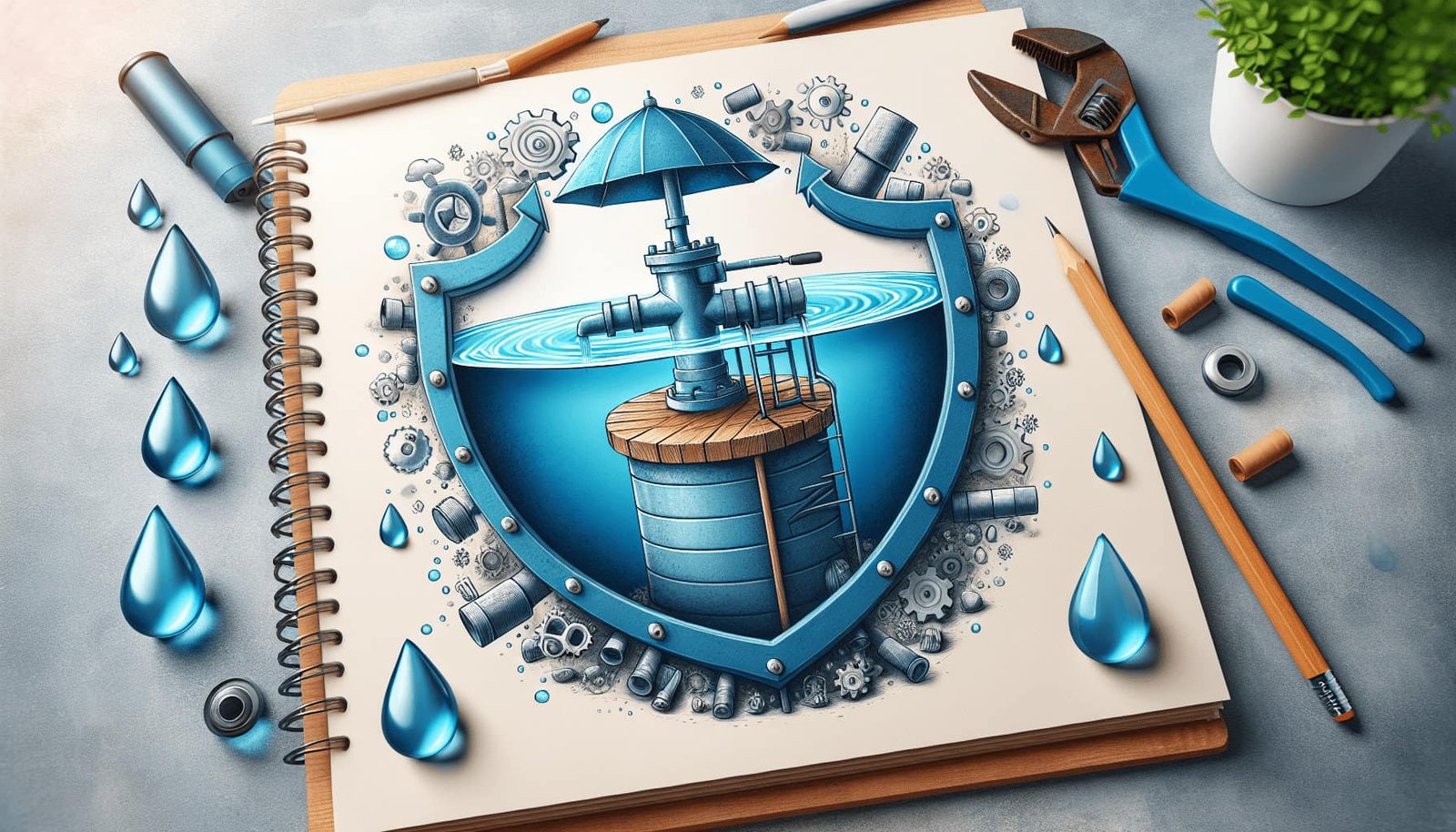Are you living in an area with well water pressure tank maintenance regulations and are you concerned about the safety of your well water? If so, you may be wondering how to address these safety concerns and ensure that your well water is clean and safe for consumption. In this article, we will explore some tips and strategies that can help you navigate these regulations and address any safety concerns you may have regarding your well water. By following these guidelines, you can have peace of mind knowing that your well water is safe and free from any potential hazards.
Understanding the Importance of Well Water Safety
Why is well water safety important?
Well water safety is crucial for maintaining the health and well-being of individuals and communities that rely on well water as their primary source of drinking water. Unlike water supplied by municipal utilities, well water is not subject to the same level of regulation and oversight. This means that it is up to individual well owners to ensure the safety and quality of their water supply.
What are the potential safety concerns related to well water?
There are several potential safety concerns associated with well water. These include bacterial and chemical contamination, as well as issues with the well water pressure tank. Bacterial contamination can occur if the well is not properly constructed or maintained, allowing for the entry of harmful microorganisms. Chemical contamination can arise from agricultural runoff, industrial pollutants, and even household products. Moreover, problems with the well water pressure tank, such as leaks or malfunctions, can lead to a drop in water pressure, affecting its usability and potentially causing damage to the well system.
Overview of Well Water Pressure Tank Maintenance Regulations
What are well water pressure tanks?
Well water pressure tanks are essential components of a well water system. They store water under pressure, allowing it to be readily available when needed. The tank acts as a buffer, reducing the frequency of the pump operation by storing water until it is required. This helps extend the life of the pump and ensures a consistent and reliable water supply.
What is the purpose of well water pressure tank maintenance regulations?
Well water pressure tank maintenance regulations are put in place to ensure the proper functioning and safety of these tanks. These regulations aim to prevent potential hazards, such as leaks or ruptures, that could compromise the integrity of the tank and the overall well system. By implementing maintenance regulations, authorities seek to safeguard public health, promote sustainability, and reduce the risk of costly repairs or system failures.
Are there specific regulations related to well water pressure tank safety?
The specific regulations related to well water pressure tank safety may vary depending on your location. However, many areas have guidelines in place that outline maintenance requirements, inspection schedules, and safety standards. These regulations typically encompass aspects such as pressure testing, system maintenance, and regular inspections to ensure compliance and minimize safety risks.

Identifying Potential Safety Issues with Well Water Pressure Tanks
How can I identify potential safety issues with my well water pressure tank?
To identify potential safety issues with your well water pressure tank, there are several key indicators to look out for. These include:
Visual inspection: Look for signs of corrosion, leaks, or any physical damage to the tank or its components. Rusty areas, bulges, or wet spots may indicate underlying problems.
Audible cues: Listen for any unusual noises coming from the tank, such as excessive vibrations, banging sounds, or hissing. These can suggest a malfunction or air pressure issues.
Performance changes: Monitor the water pressure and flow rate from your taps and fixtures. A significant drop in pressure or inconsistent water supply could signal a problem with the pressure tank.
Pressure gauge reading: Check the pressure gauge regularly. If the pressure fluctuates outside of the acceptable range, it may indicate a fault with the pressure tank or the overall well system.
What are the signs of a failing well water pressure tank?
A failing well water pressure tank may exhibit various signs, including:
Rapid cycling: Frequent turning on and off of the pump, known as rapid cycling, can indicate that your pressure tank is not functioning correctly. This can lead to premature wear and tear on the pump and affect the overall efficiency of the well system.
Waterlogging: If you notice excess water in the pressure tank or observe water flowing back into the well after the pump shuts off, it may suggest that the tank is waterlogged. This can decrease its storage capacity and put additional strain on the pump.
Fluctuating pressure: Inconsistent water pressure, such as sudden surges or drops, can indicate a failing pressure tank. These fluctuations may disrupt the delivery of water and create an inconvenience for household use.
What are the risks associated with a malfunctioning pressure tank?
A malfunctioning pressure tank can pose several risks to both the well system and the individuals relying on the well water. These risks include:
Reduced water availability: A failing pressure tank may result in decreased water pressure and flow rate, limiting the availability of water for everyday activities such as showering, washing dishes, or doing laundry.
Increased energy consumption: When a pressure tank malfunctions, the pump may need to operate more frequently to maintain water pressure. This can lead to higher energy consumption and increased utility costs.
System damage: If a pressure tank fails completely, it can cause damage to the well pump by continuously running or cycling excessively. This can result in premature pump failure, requiring costly repairs or replacement.
Ensuring Compliance with Well Water Pressure Tank Maintenance Regulations
What are the steps to ensure compliance with well water pressure tank maintenance regulations?
To ensure compliance with well water pressure tank maintenance regulations, consider the following steps:
Familiarize yourself with the regulations: Start by reading and understanding the specific regulations and guidelines applicable to your area. These can typically be found on the website of your local health department or water authority.
Schedule regular inspections: Arrange for regular inspections of your well water pressure tank by a qualified professional. They can assess the condition of the tank, perform necessary tests, and identify any potential safety issues.
Maintain a maintenance schedule: Create a maintenance schedule for your well system that includes tasks such as checking the pressure tank, testing the pressure switch, and verifying the pressure relief valve. Adhering to this schedule will help ensure the ongoing safety and functionality of your well water system.
How often should I inspect and maintain my well water pressure tank?
The frequency of inspections and maintenance for your well water pressure tank may vary depending on local regulations and the specific characteristics of your well. As a general guideline, it is recommended to have a professional inspection of your well water pressure tank at least once every one to two years. However, it is essential to consult local guidelines and consider factors such as well usage, water quality, and individual system requirements. Regular maintenance, including visual checks and basic tasks such as cleaning the tank exterior, should be conducted more frequently.
What are the consequences of non-compliance with the regulations?
Non-compliance with well water pressure tank maintenance regulations can have various consequences. These can range from minor issues, such as warnings or fines, to more severe outcomes, including legal actions or restrictions on the use of the well water system. Moreover, failing to comply with the regulations puts the health and safety of individuals at risk and may result in water contamination, system failures, or potential liabilities. It is vital to take the necessary steps to understand and meet the compliance requirements to ensure the safety and reliability of your well water system.

Addressing Common Safety Concerns with Well Water
How can I address concerns about bacterial contamination in well water?
Addressing concerns about bacterial contamination in well water requires a proactive approach to well maintenance and regular testing. Here are some steps you can take:
Regular testing: Periodically test your well water for bacteria, such as coliform or E. coli. Testing should be conducted according to local guidelines and recommended frequencies. If any contamination is detected, appropriate treatment methods should be implemented.
Proper well construction: Ensure that your well is constructed and located according to approved standards. This includes proper casing, sealing, and wellhead protection to minimize the risk of bacterial intrusion.
Well disinfection: If bacterial contamination is identified or suspected, well disinfection procedures should be followed. This typically involves flushing the well, adding a disinfectant (such as chlorine), and thoroughly cleaning all connected components.
What measures can I take to prevent well water contamination from chemicals and pollutants?
To prevent well water contamination from chemicals and pollutants, consider the following measures:
Manage potential sources: Minimize the use of chemicals near your well, such as fertilizers, pesticides, or fuels. Store these substances away from the wellhead and use them in moderation, following manufacturer instructions.
Regular maintenance: Maintain your well system properly to prevent any leaks or cracks that could allow contaminants to enter. Promptly repair any damage to pipes, seals, or other components to ensure the integrity of your well system.
Test water quality: Regularly test your well water for common contaminants, including heavy metals, pesticides, or volatile organic compounds (VOCs). This will allow you to identify any issues early on and take appropriate actions to address them.
What should I do in case of a sudden drop in well water pressure?
In the event of a sudden drop in well water pressure, consider the following steps:
Check for common causes: Determine if the drop in pressure is occurring throughout the entire household or is isolated to specific fixtures. This can help pinpoint the potential cause, such as a faulty pressure tank, a well pump issue, or a clogged water line.
Inspect the pressure tank: Conduct a visual inspection of your well water pressure tank for any signs of damage or malfunction. Look for leaks, cracks, or evidence of waterlogging.
Consult a professional: If you are unable to identify the cause or if there are significant concerns about the pressure tank or the well system, it is advisable to seek assistance from a qualified well water service provider. They can diagnose the issue, perform necessary repairs or replacements, and ensure the integrity of your well water system.
Educating Yourself on Well Water Safety
Where can I find reliable information on well water safety?
Reliable information on well water safety can be obtained from various sources. Consider the following:
Local health department: Your local health department is a valuable resource for information regarding well water safety and regulations specific to your area. They can provide guidelines, pamphlets, and other educational materials related to well water quality and maintenance.
Water testing laboratories: Contact a certified water testing laboratory in your region. They can provide detailed information on the testing processes, possible contaminants, and the interpretation of test results.
Online resources: Visit reputable websites that specialize in well water safety and provide comprehensive information on various topics, including well construction, maintenance, and treatment methods.
What resources are available to help me understand well water pressure tank maintenance?
Several resources are available to help you understand well water pressure tank maintenance. These include:
Manufacturer’s guidelines: Consult the manual or guidelines provided by the manufacturer of your specific pressure tank. They often include instructions, maintenance schedules, and recommended procedures for ensuring the safe and effective operation of the tank.
Local regulations and authorities: Refer to the well water pressure tank maintenance regulations in your area. These guidelines may provide information on inspection requirements, maintenance recommendations, and safety standards related to pressure tanks.
Professional well water service providers: Reach out to reputable well water service providers in your locality. They can offer expert advice, maintenance plans, and tailored recommendations based on your specific well system.
Are there any training programs or certifications for well-owners?
In some regions, there may be training programs or certifications available for well-owners. These programs are designed to educate individuals on various aspects of well water safety, maintenance, and best practices. They often cover topics such as well construction, water quality testing, troubleshooting common issues, and understanding local regulations. Check with your local health department or well water associations to see if any such programs or certifications are offered in your area.

Taking Proactive Steps for Well Water Safety
What are the proactive measures I can take to ensure well water safety?
To ensure well water safety, it is essential to take proactive measures. Consider the following steps:
Regular testing: Schedule regular testing of your well water for various contaminants. This includes testing for bacteria, nitrates, heavy metals, and other potential pollutants. Following recommended testing frequencies will help identify any issues and allow for appropriate actions to be taken.
Maintain a clean well environment: Keep the area surrounding your well clean and free from potential contaminants. Do not store chemicals, fertilizers, or oils near the wellhead, and ensure proper disposal of household waste and hazardous materials.
Monitor and record water quality: Keep a record of your water quality testing results to track any changes or trends over time. This can help identify potential issues, evaluate the effectiveness of any implemented treatments, and provide useful information for professionals assessing the well system.
How can I properly maintain and sanitize my well water system?
Proper maintenance and sanitization of your well water system are crucial for ensuring its safety. Follow these guidelines:
Routine maintenance: Regularly inspect your well system for any signs of damage or leaks. Keep the wellhead sealed and protected to prevent the entry of contaminants. Clean the well pump and pressure tank, if necessary, according to manufacturer guidelines.
Well disinfection: Conduct periodic well disinfection using appropriate methods. This is especially important if contamination or bacterial issues have been detected. Follow the recommended procedures provided by professionals or water quality experts.
Professional assistance: Consider hiring a reputable well water service provider for more comprehensive maintenance and sanitization. They can perform thorough cleaning, disinfection, and other necessary tasks with their specialized expertise and equipment.
Are there any products or equipment that can help enhance well water safety?
Several products and equipment are available to help enhance well water safety. These include:
Water filters and purifiers: Install water filtration or purification systems that effectively remove specific contaminants from your well water. Choose systems that are certified to meet industry standards and are suitable for your specific water quality requirements.
Pressure tank monitors: Use pressure tank monitors that provide real-time information on the tank pressure and other parameters. These monitors can alert you to potential issues with the pressure tank, allowing for prompt action.
Water testing kits: Purchase water testing kits specifically designed for well water. These kits usually contain the necessary materials and instructions to conduct basic water quality tests at home. They can serve as a convenient tool for regular monitoring and initial screenings.
Seeking Professional Assistance for Well Water Issues
When should I seek professional help for well water issues?
It is advisable to seek professional help for well water issues in the following situations:
System malfunctions: If your well water system is experiencing significant issues, such as frequent pump failures, consistent drop in water pressure, or unusual noises, it is wise to consult a professional well water service provider. They can diagnose the problem, provide expert advice, and perform necessary repairs or replacements.
Water quality concerns: If you have concerns about the quality of your well water, such as strong odors, discoloration, or unusual taste, it is recommended to contact a certified water testing laboratory or well water service provider. They can assess the water quality, identify potential contaminants, and suggest appropriate treatment methods.
Compliance requirements: If you are unsure about the specific regulations and maintenance requirements for your well water pressure tank, contacting a professional well water service provider or local health department can provide much-needed guidance. They can help you understand and meet the compliance standards, ensuring the safety and reliability of your well system.
What type of professionals can assist with well water pressure tank maintenance?
Various professionals can assist with well water pressure tank maintenance, including:
Certified well water service providers: These professionals specialize in well water systems and can offer a range of services, including inspections, repairs, maintenance, and treatments. They understand local regulations and have the expertise to address issues related to pressure tanks and other components of the well system.
Plumbing contractors: Experienced plumbing contractors can also assist with well water pressure tank maintenance. They have the necessary knowledge and skills to diagnose and repair issues with the pressure tank, well pumps, and associated plumbing.
How can I find a reputable well water service provider?
To find a reputable well water service provider, consider the following steps:
Research and recommendations: Conduct online research to find well water service providers in your area. Read reviews and customer testimonials to gauge their reputation and reliability. Additionally, seek recommendations from neighbors, friends, or local community groups who may have experience with well water service providers.
Certification and credentials: Look for well water service providers who have the relevant certifications and credentials. This ensures that they have undergone necessary training and adhere to industry standards.
Consultations and estimates: Arrange consultations with potential well water service providers to discuss your maintenance needs. Request estimates for the services they provide and compare them to make informed decisions.

Community Engagement and Advocacy for Well Water Safety
How can I raise awareness about well water safety in my community?
To raise awareness about well water safety in your community, consider the following actions:
Organize workshops or seminars: Host educational workshops or seminars focused on well water safety. Invite local health experts, well water professionals, or representatives from organizations working in the field to speak and provide guidance.
Distribute informational materials: Create and distribute pamphlets, brochures, or fact sheets that outline the importance of well water safety and provide guidance on well maintenance. Distribute these materials at community centers, local events, or door-to-door.
Online platforms and social media: Utilize online platforms and social media channels to share information on well water safety. Create dedicated groups or pages to engage with community members and provide a platform for sharing experiences and knowledge.
What role can local authorities and organizations play in ensuring well water safety?
Local authorities and organizations play a crucial role in ensuring well water safety. They can:
Establish and enforce regulations: Local authorities can establish well water safety regulations, including maintenance requirements, testing standards, and guidelines for pressure tank inspections. They can also enforce compliance within the community to ensure the well systems are safe and maintained to the required standards.
Provide educational resources: Local authorities and organizations can develop educational resources, such as brochures, videos, or websites, that provide information and guidance on well water safety, maintenance, and best practices.
Conduct community outreach programs: Authorities and organizations can organize community outreach programs focused on well water safety. They can hold public meetings, distribute information at local events, or provide platforms for well owners to ask questions and seek assistance.
Are there any advocacy groups or campaigns focused on well water issues?
There are advocacy groups and campaigns focused on well water issues that aim to promote well water safety and advocate for adequate regulations and support. These groups often work to raise public awareness, provide resources and information, and encourage proper maintenance and testing of well water systems. Research local and national well water associations, nonprofit organizations, or environmental advocacy groups to learn more about their initiatives and see how you can participate or support their efforts.
Monitoring and Testing Well Water Quality
Why is regular testing of well water quality important?
Regular testing of well water quality is important for several reasons:
Health protection: Testing well water allows for the identification of potential contaminants that may pose health risks. Regular monitoring helps ensure the safety of the water consumed by individuals and can lead to prompt actions to address any emerging issues.
Early detection of problems: Routine testing helps identify changes in water quality over time. By establishing a baseline and monitoring for any deviations, it becomes easier to detect problems at an early stage and take appropriate remedial measures.
Compliance with regulations: Regular testing is often required as part of compliance with local regulations. By conducting testing as per the prescribed frequencies, you can demonstrate adherence to the regulations and maintain a reliable well water system.
What contaminants should I test for in my well water?
The specific contaminants you should test for in your well water may vary depending on your location and specific circumstances. However, here are some common contaminants that are often recommended for testing:
Bacteria: Testing for bacterial contaminants, such as coliform or E. coli, is crucial to ensure the safety of your well water and prevent waterborne illnesses.
Nitrates: Nitrates can come from fertilizers, septic systems, or animal waste and can be harmful, especially to infants and young children. Testing for nitrates is essential, particularly in agricultural areas or areas with a history of nitrate pollution.
Heavy metals: Testing for heavy metals like lead, arsenic, or mercury is essential to identify potential contamination from natural sources, industrial activities, or corroded plumbing.
Pesticides and herbicides: If your well is located near agricultural areas or chemical-intensive zones, testing for pesticides and herbicides is crucial to assess potential contamination risks.
Volatile organic compounds (VOCs): VOCs can come from industrial activities, fuel storage, or household chemicals. Testing for VOCs helps detect potential contamination that may impact the water quality and pose health risks.
How can I interpret the results of well water quality tests?
Interpreting the results of well water quality tests often requires professional assistance or consultation with water quality experts. They can help you understand the significance of the findings and provide recommendations based on the specific contaminants detected.
When reviewing the test results, pay attention to the acceptable thresholds or standards set by local regulatory bodies or health authorities for each specific contaminant. If any contaminant exceeds the recommended limits, it is crucial to take appropriate actions to rectify the issue. This may include implementing treatment measures, consulting experts for further guidance, or seeking assistance from professionals for repairs or system improvements.
Remember that the interpretation of results may be complex, as certain contaminants may require additional analysis or specialized knowledge. Obtaining guidance from experts ensures a thorough understanding of the results and empowers you to make informed decisions regarding the safety and quality of your well water.

